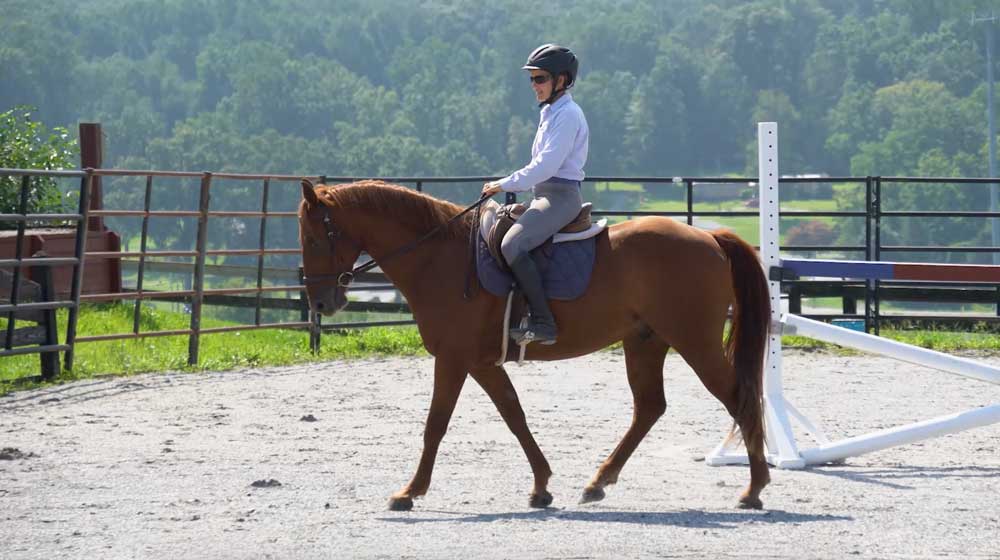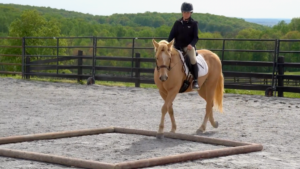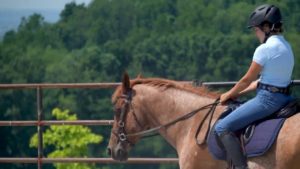There are many terms in riding that are a bit vague.
Commonly used, but rarely explained.
Inside leg to outside rein is one of these vague terms.
It is a concept, a key concept for encouraging balanced movement from a horse, but many riders don’t actually know what this means or more importantly, what this feels like.
When I teach riding, I prefer to give both explanations and exercises. When we understand what we are doing, why we are doing it, and can feel it – this creates true confidence!
In today’s video, I will do just this with the inside leg to outside rein concept – demonstrate what this means with our school horse AppleJack, explain why this is important (even if you are a trail rider), and then teach you an exercise to feel this with your own horse.
Click Play to watch below!














31 Responses
Hi, I am really interested in coming to the states to take a course irl. Is that possible? I live in Sweden so it takes some planning but it would be just fantastic to do this.
Do you have these arrangements?
Yes, we would love to have you come! We do offer private intensives here at our farm campus, learn more here: https://www.horseclass.com/private-intensives/
Send us an email at info@horseclass.com if you have any questions!
Callie I really appreciate you explaining this in great detail and showing the right and wrong ways of the exercise. Well done and I would like to see more. Thank you. Marian Taylor
Callie, this was a wonderful explanation and demonstration. Thank you so much. Cannot wait to try it.
Hello. I am wanting to watch the leg to hand video, but can’t seem to find the link. I did Purchase the book and I am guessing a membership, but I am not sure if that allows me access to this video. Any assistance would be deeply appreciated. Thank you!
Hi Kathy, we would love to help you out, but I don’t fully understand your question. The Inside Leg to Outside Hand video is above on this page where you commented, and you can log in to your videos that come with the Stay in the Saddle Book at: https://members.horseclass.com/login
If you have any more trouble, email us at support@horseclass.com!
Hi Calli,
Thank you for getting back to me. When I click play, I don’t find a link, and can’t access the information. Not sure if I am clicking on the correct place or not!
Appreciate any help you can provide.
Kathi
Hi Kathy, unfortunately, I don’t think I fully understand your question, can you send us an email at support@horseclass.com and let us know more? Is the video on this post not playing for you? Have you perhaps tried on a different device?
Callie, This is wonderful. I can really see the visual. Once I can see it and do the exercise, I will know what it feels like. I like the concept of inside leg/outside rein done along the fence line. I will keep ypu posted on the results.
This was a great explanation and made me understand the pitfalls of that exercise but also the purpose of it relating to working on a circle. This is something I do regularly in hand before I hop on to help my elderly girl loosen up but I can now see that when I try it in ridden work I probably ask for too much at a time as she does sometimes get quite tense….the last thing I want for her! Thankyou.
Hi Kate!
Asking for a little, even if it’s only one step, then releasing is a great way to start. You can then gradually ask for two steps, then three, until you can ask for a complete turn on the forehand or haunches at a time. Play with little bits at a time, then building to more, and see if it helps. With lots of praise along the way!
Couple of terms are tough for me. Half halt and stirrup stepping.
Another question. If I purchased the balanced riding class in the past does this include the updated one?
Hi Callie, thanks for the great demo! I like the exercise you showed and will give that a go once the rain has stopped here .
.
However, which aid asks for keeping forward though? Is that a stronger inside leg or the whip or?
Thank you Callie. Very useful information and well explained and demonstrated. Marjorie
I don’t know how, but you always seem to cover the exact topics I seem to be working on with my trainer! This was a great explanation and I’ll be sure to try it out tomorrow. Thank you for all your videos. They have helped me so much already.
Thank you for sharing! So glad our videos have helped you.
I have never fully understood the half halt.
This video was the clearest explanation of a counter leg yield that I have ever heard.
Thank you for explaining this concept in simple terms and in slow motion. My trainer uses this term and explains it, but not nearly so well. The demonstration was very helpful. Thank you.
Excellent explanation and demonstration!! I’ve watched other demos of this maneuver but none as clearly explained as what you have here. Thank you!!
Hi Callie, this is great. Can you clarify for me where your weight is on your seatbones, for instance if you track left so your left leg is the inside and your right hand is the outside rein. I know you need to be centered but I believe you do need your weight shifted correctly? Thanks!
I have watch many of your videos and have never commented. But the “inside leg, outside rein” video is the Best by far and deserves a comment. Please do more just like this one.
How about the “half halt” or cantering a horse that has never cantered in saddle.
I’ve often been asked for outside rein, inside leg without really understanding it. I now understand the phrase with your explanation!!!! Many thanks!
When you said not to keep a cue constant as it dulls the horse – that brought a question to me. My trainer has asked me to hold my horses head to the side until the horse softens. Then, I release. This is suppose to teach her to bend – this is my understanding.
But, I’m questioning if this steady pressure until she gives to the pressure will dull her. I’m a bit uncomfortable with applying the steady pressure as I feel it’s a bit harsh. What are your thoughts?
It’s the release that teaches what you want. Start as soft as you can to get the desired result increase pressure if needed, and as soon as they soften release.
Thank you for this video. I second the suggestion for an explanation/demo of the proper usage and technique of the half halt.
Callie, I love how you explain things, and demonstrate not only the correct way of doing an exercise, but also what some common errors are. Would love to someday take a course.
Hi Elke!
Callie really does have a unique approach to the horse. If you are interested in learning more, but are not ready to make the commitment to a full course yet, check out our free mini course “Better Riding in 7 Days”!
https://www.horseclass.com/7days/
Callie will share ways to improve your balance, stability, and confidence with horses while providing even more great exercises to try.
Callie, great video! I know for me, I have been taught to use inside leg to outside rein specifically for the canter. Would this help with shoulder-in?
I am wondering if this maneuver is called a haunches in?
Callie, very informative! I do really appreciate your way of explaining and demonstrating! (All the topics)
Thank you!
Hi Callie,
My daughter is wondering if you are cuing the horse to reach under more as you sit or rise?
Thank you for this explanation of “inside leg to outside rein.” I appreciated your step-by-step description of what the rider is doing and how the horse should respond to what the rider is doing. Excellent video and commentary. I could actually see most of what you were describing. Thank you, Callie!